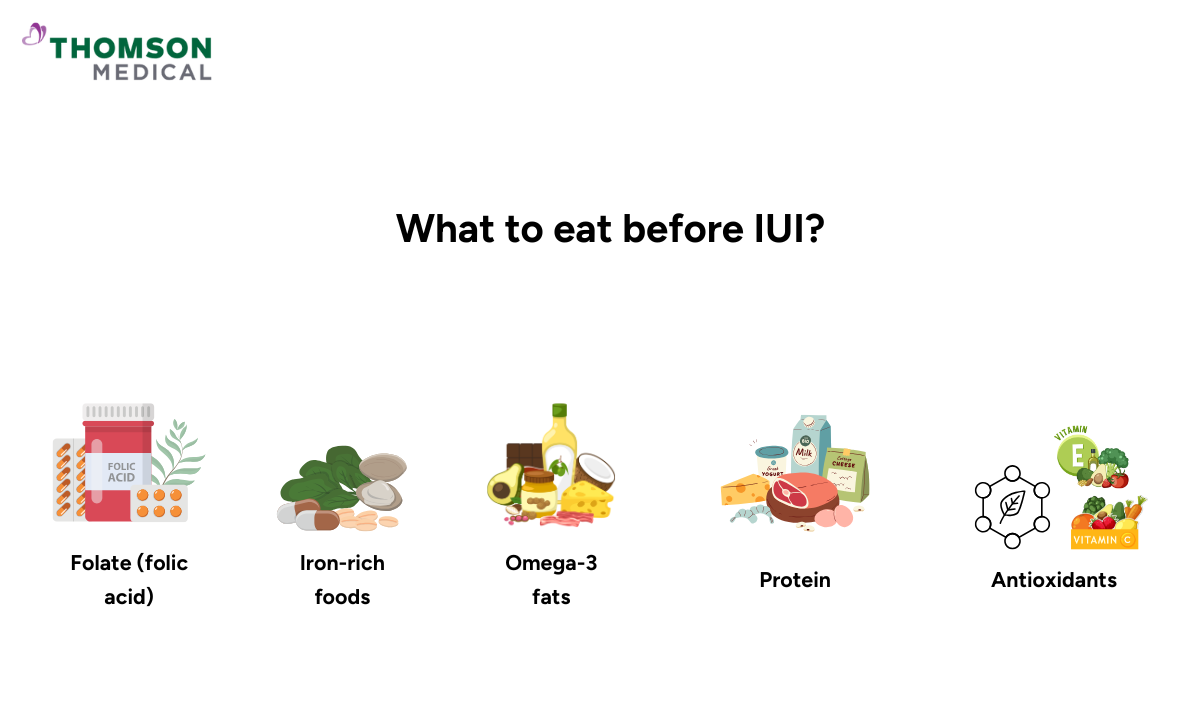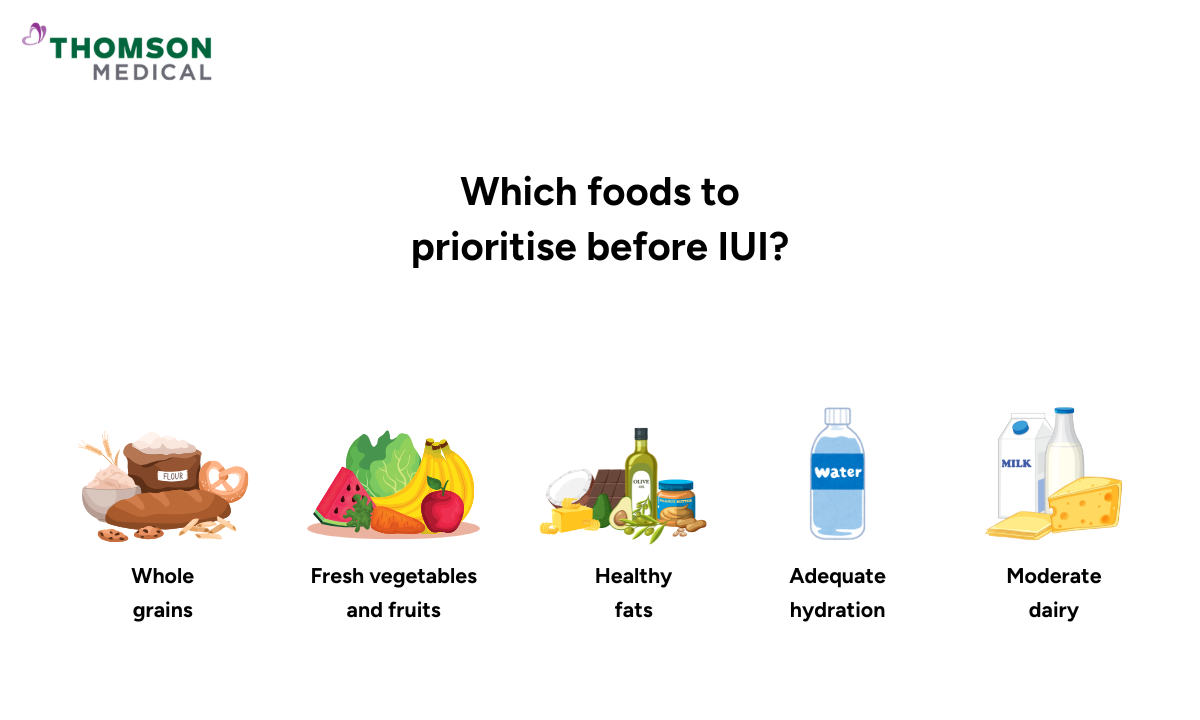Getting ready for an intrauterine insemination (IUI) treatment often comes with many questions, including what to eat before IUI to boost your chances of success. The truth is, nourishing your body with the right foods can give you a small but meaningful boost on your fertility journey. Think of it as a way of caring for yourself while giving your treatment the best possible start.
Why does nutrition matter before IUI?
The food you eat before an intrauterine insemination (IUI) can do more than just fuel your body, as it can directly support your fertility. A balanced, nutrient-rich diet helps regulate hormones, promotes healthy egg quality, and prepares the uterus for successful implantation. By choosing the right foods in the weeks leading up to your IUI cycle, you’re not only improving your chances of conception but also caring for your overall well-being throughout this important stage of your fertility journey.
What to eat before IUI: Key nutrients to include

Folate (folic acid)
Folic acid is essential for cell division and DNA synthesis, making it a vital nutrient before conception. It helps women to ovulate properly and reduces the risk of neural tube defects in unborn babies. Add folate-rich foods like leafy greens, lentils, fortified cereals, and citrus fruits to your diet.
Iron-rich foods
Iron helps support ovulation and builds a nutrient-rich uterine lining. Low iron levels can make it harder to conceive. Include both heme sources (lean red meat) and non-heme sources (spinach, beans, tofu) in your meals. Pair plant-based sources with vitamin C-rich foods, such as oranges or bell peppers, to improve absorption.
Omega-3 fats
Omega-3 fatty acids are important for hormone production, reducing inflammation, and improving egg quality. You can get them from salmon, sardines, chia seeds, flaxseeds, and walnuts. If you don’t eat much fish, ask your doctor if a high-quality omega-3 supplement might be suitable for you.
Protein
Protein supports egg development and overall reproductive health. Try to eat a mix of plant-based proteins (legumes, nuts, seeds) and lean animal proteins (chicken, eggs, fish). Replacing some refined carbs with plant proteins may even improve fertility outcomes.
Antioxidants
Antioxidants protect egg and sperm cells from oxidative stress, which can cause cell damage. Important antioxidants include vitamins C and E, selenium, and zinc. Berries, dark chocolate (in moderation), nuts, seeds, and colourful vegetables are all great sources.
Looking for nutrition advice before your IUI? Our fertility specialists at Thomson Medical are here to guide you with tailored diet and lifestyle recommendations to support your treatment. Request an appointment with us and take the next step in giving your fertility journey the best possible start.
Which foods to prioritise before IUI?

When you’re preparing for IUI, food is more than just fuel. The choices you make can give your body gentle support, balance your hormones, and even make you feel more grounded during a time that can feel a little overwhelming. Here are some of the foods that might help most:
Whole grains
Whole grains are good for you because they provide complex carbohydrates, fibre, and B-vitamins. These help to regulate blood sugar and support hormone balance. Unlike refined grains, they improve insulin sensitivity, which is especially beneficial for women with PCOS or irregular cycles. Good options include brown rice, oats, quinoa, and whole wheat bread.
Fresh vegetables and fruits
A colourful variety of fruits and vegetables supplies essential vitamins, minerals, fibre, and phytonutrients. Try to have 5–7 servings a day to maximise the benefits. Where possible, choose organic produce to reduce pesticide exposure, which may impact fertility.
Healthy fats
Unsaturated fats play a key role in hormone production and egg quality. Add olive oil, avocados, nuts, and seeds to your meals while avoiding trans fats found in fried or heavily processed foods, as they can disrupt ovulation.
Adequate hydration
Staying hydrated is essential for your overall health and fertility treatment. Proper hydration supports cervical mucus production, which helps sperm travel during IUI. Aim for at least 8–10 glasses of water daily, or more if you’re physically active or live in a hot climate.
Moderate dairy
Moderate intake of full-fat dairy products may support ovulation, while too much low-fat dairy could have the opposite effect. Yoghurt and cheese are excellent sources of calcium and probiotics, which aid hormone regulation and gut health. Choose plain Greek yoghurt, full-fat milk in moderation, and cheese while avoiding low-fat options with added sugars.
Our fertility specialist
Loading...
FAQ
What is the best overall diet to follow before IUI?
The Mediterranean diet is often considered the best choice before IUI treatment. It focuses on fresh fruits and vegetables, whole grains, legumes, nuts, seeds, healthy fats like olive oil, and moderate amounts of fish and poultry. This nutrient-rich diet supports hormone balance, egg health, and uterine receptivity, and research links it to better fertility outcomes with IUI and IVF.
Are there foods that help reduce oxidative stress before IUI?
Yes. Oxidative stress can affect egg quality, ovarian function, and implantation, but antioxidant-rich foods help protect reproductive cells. They also support sperm health, making them beneficial for both partners. Some of the key sources include:
Vitamin C: Oranges, strawberries, bell peppers, kiwi
Vitamin E: Sunflower seeds, almonds, spinach
Selenium: Brazil nuts, tuna, whole grains
Zinc: Pumpkin seeds, chickpeas, beef
Beta-carotene: Carrots, sweet potatoes, leafy greens
Polyphenols: Green tea, berries, olive oil, dark chocolate (in moderation)
Should I include healthy fats in my pre-IUI diet?
Yes. Healthy fats are essential for hormone production, egg development, and reducing inflammation. They also help your body absorb key vitamins (A, D, E, and K) that support fertility. Adding monounsaturated fats like avocados, olive oil, and nuts, along with omega-3s from salmon, mackerel, chia seeds, flaxseeds, and walnuts, can improve egg quality and ovulation, which are the important factors for IUI success.
How important is hydration before IUI?
Hydration is very important before and during IUI. Drinking enough water helps maintain healthy cervical mucus for sperm transport, improves blood flow to reproductive organs, and supports both egg and endometrial health. Staying hydrated also aids detoxification and hormonal balance, creating a more supportive environment for conception.
Why are folate-rich foods important before IUI?
Folate (vitamin B9) is vital for DNA synthesis, cell growth, and healthy ovulation. It supports egg quality, embryo development, and early neural tube formation in pregnancy. Folate also helps regulate hormones through methylation, a key reproductive process. Good food sources include leafy greens, legumes, broccoli, asparagus, oranges, strawberries, and fortified grains. Most fertility specialists recommend combining these foods with a prenatal supplement containing 400–800 mcg of folic acid daily.
How can avoiding processed foods increase my chances of successful conception?
Processed foods, such as sugary snacks, refined carbs, fast food, and packaged meals, are often high in:
Trans fats, which can disrupt ovulation.
Refined sugars, which may lead to insulin resistance and hormone imbalance.
Preservatives and additives, which may affect reproductive health.
Empty calories, offering little nutrition needed for fertility.
By limiting processed foods, you reduce inflammation, stabilise blood sugar, and support hormonal balance. This creates a healthier environment for ovulation, fertilisation, and implantation, which are key steps for IUI success.
The information provided is intended for general guidance only and should not be considered medical advice. For personalised recommendations and tailored advice, please consult a specialist at Thomson Medical. Request an appointment with Thomson Medical today.
For more information, contact us:
Thomson Fertility
- Paragon: 6252 7766
Thomson Specialists (Women's Health)
Request an Appointment